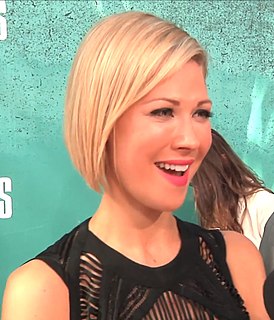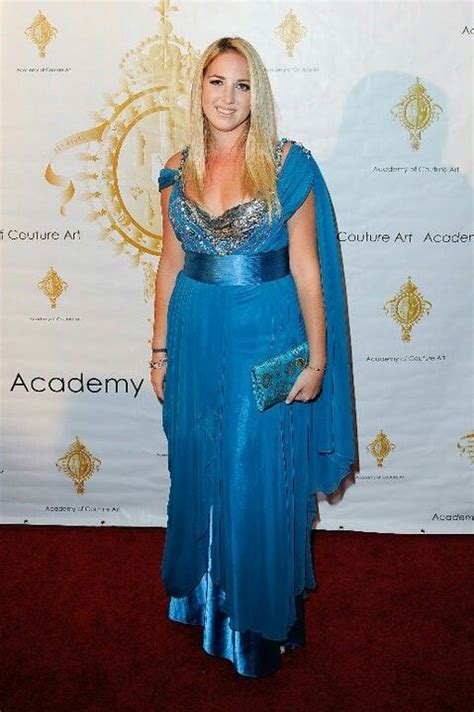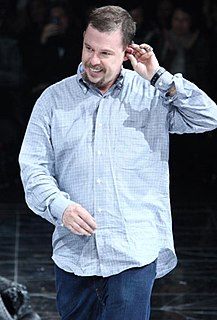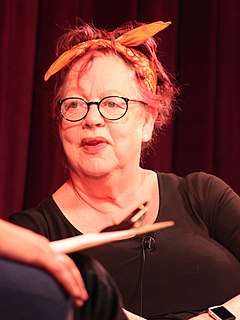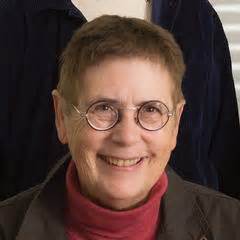A Quote by Diane von Furstenberg
I've always been inspired by women, and my mission was to inspire women. I always wanted to become a certain kind of woman, and I became that woman through fashion. It was a dialogue. I would see that the wrap dress made those women confident, and made them act with confidence.
Related Quotes
I've never been interested in dressing one woman. What's interested me was to have a philosophy. It hasn't been important to put a woman in a blue dress. I wanted to dress women who wanted to look at themselves. To stand out. To be women who were not part of the crowd. A woman who fights and advances.
We women are callow fledglings as compared with the wise old birds who manipulate the political machinery, and we still hesitate to believe that a woman can fill certain positions in public life as competently and adequately as a man. For instance, it is certain that women do not want a woman for President. Nor would they have the slightest confidence in her ability to fulfill the functions of that office. Every woman who fails in a public position confirms this, but every woman who succeeds creates confidence.
It occurred to me that there have always been selkie women: women who did not seem to belong to this world, because they did not fit into prevailing notions of what women were supposed to be. And if you did not fit into those notions, in some sense you weren't a woman. Weren't even quite human. The magical animal woman is, or can be, a metaphor for those sorts of women.
I am constantly trying to reflect the way women are treated. It's hard to interpret that in clothes or in a show but there's always an underlying, sinister side to women's sexuality in my work because of the way I have seen women treated in my life. Where I come from, a woman met a man, had babies, moved to Dagenham, two up two down, made the dinner, went to bed. That was my image of women and I didn't want that. I wanted to get that out of my head.
Pristine vulnerability is just so boring to me. The performances that I love are ones like Gena Rowland's in 'A Woman Under the Influence,' where women are allowed to be messy and imperfect. It's that kind of woman that has always inspired me to seek roles that are a little out of the box. I just haven't always had the opportunity to do them.
Women sometimes really love to look at other beautiful women on the screen. But they don't look at a woman the way a man looks at a woman. They want to be that woman. They like if a woman is beautiful or sexy, especially if she's powerful. They like to see her catch a man, or to be powerful in the world. I think this is why a lot of women love noir films and classic films because they can really identify with these really strong, beautiful women. That's the kind of power that women have lost culturally.
I know there are certain men that hate women or don't like women, and in order to make women feel small, they tend to isolate them when they bully them. And women are often humiliated by it and feel they can't do anything about it. So my advice to women would be: there's always support around for those sorts of things and if you feel you're isolated in any way, or being bullied, you must talk to someone about it.
A mismatched outfit, a slightly defective denture, an exquisite mediocrity of the soul-those are the details that make a woman real, alive. The women you see on posters or in fashion magazines-the ones all the women try to imitate nowadays-how can they be attractive? They have no reality of their own; they're just the sum of a set of abstract rules. They aren't born of human bodies; they hatch ready-made from the computers." ~The Book of Laughter and Forgetting
I wish you would stop and seriously consider, as a broad and long-term feminist political strategy, the conversion of women to a woman-identified and woman-directed sexuality and eroticism, as a way of breaking the grip of men on women's minds and women's bodies, of removing women from the chronic attachment to the primary situations of sexual and physical violence that is rained upon women by men, and as a way of promoting women's firm and reliable bonding against oppression. . . .


